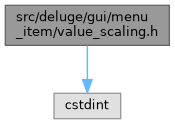 |
Deluge Firmware 1.3.0
Build date: 2026.03.02
|
 |
Deluge Firmware 1.3.0
Build date: 2026.03.02
|
#include <cstdint>

Go to the source code of this file.
Functions | |
| int32_t | computeCurrentValueForStandardMenuItem (int32_t value) |
| int32_t | computeFinalValueForStandardMenuItem (int32_t value) |
| int32_t | computeCurrentValueForHalfPrecisionMenuItem (int32_t value) |
| int32_t | computeFinalValueForHalfPrecisionMenuItem (int32_t value) |
| int32_t | computeCurrentValueForPan (int32_t value) |
| int32_t | computeFinalValueForPan (int32_t value) |
| int32_t | computeCurrentValueForUnsignedMenuItem (uint32_t value) |
| uint32_t | computeFinalValueForUnsignedMenuItem (int32_t value) |
| int32_t | computeCurrentValueForTranspose (int32_t transpose, int32_t cents) |
| void | computeFinalValuesForTranspose (int32_t current, int32_t *transpose, int32_t *cents) |
Functions that convert parameter values between forms displayed on the UI (typically 0-50, but there are variations), and forms stored internally and on SD (typically whole int32_t range.)
computeCurrentValueForXXX() takes the internally stored value and computes the value displayed on the UI.
computeFinalValueForXXX() takes the value displayed on the UI and computes the internally stored value.
These are in non-member functions for ease of testing. The param classes pulls in a lot of stuff!
Generally speaking the call chains are:
SomeClass::readCurrentValue() -> computeCurrentValueForSomeClass()
SomeClass::writeCurrentValue() -> SomeClass::getFinalValue() -> -> computeFinalValueForSomeClass()
Done:
Done, but current value == final value so no function
Special cases:
As stuff is extraced and turns out to be functionally identical the dupes should be eliminated.
When we have all the functionally distinct variations here, and we have tests for them, then we can replace them with a parametrized version or two.
...and then it should be easier to make changes like specifying envelope times in seconds and bitcrushing in bits, hopefully without needing specialized code to handle existing saves – or at least have unit tests for the conversion code if it is needed.
| int32_t computeCurrentValueForHalfPrecisionMenuItem | ( | int32_t | value | ) |
Scales 0-INT32_MAX range to 0-50 for display.
| int32_t computeCurrentValueForPan | ( | int32_t | value | ) |
Scales INT32_MIN-INT32_MAX range to -25-25 for display.
| int32_t computeCurrentValueForStandardMenuItem | ( | int32_t | value | ) |
Scales INT32_MIN-INT32_MAX range to 0-50 for display.
| int32_t computeCurrentValueForUnsignedMenuItem | ( | uint32_t | value | ) |
Scales UINT32 range to 0-50 for display.
Note UNSIGNED input!
Is well behaved for whole UINT32 range despite the final value computation not utilizing the whole range.
While both ratchets and rhythm use this, there doesn't seeem to be a clear abstraction or category they embody which leads to this computation, particularly with the final value computation not utilizing the whole range – otherwise we could call these ...ForUnsignedMenuItem, maybe?
| int32_t computeFinalValueForHalfPrecisionMenuItem | ( | int32_t | value | ) |
Scales 0-50 range to 0-INT32_MAX for storage and use.
| int32_t computeFinalValueForPan | ( | int32_t | value | ) |
Scales -25 to 25 range to INT32_MIN-INT32_MAX for storage and use.
| int32_t computeFinalValueForStandardMenuItem | ( | int32_t | value | ) |
Scales 0-50 range to INT32_MIN-INT32_MAX for storage and use.
| uint32_t computeFinalValueForUnsignedMenuItem | ( | int32_t | value | ) |
Scales 0-50 range to 0-(UINT32-45) for storage and use.
Note UNSIGNED output!
See comment in the current value computation above for more.